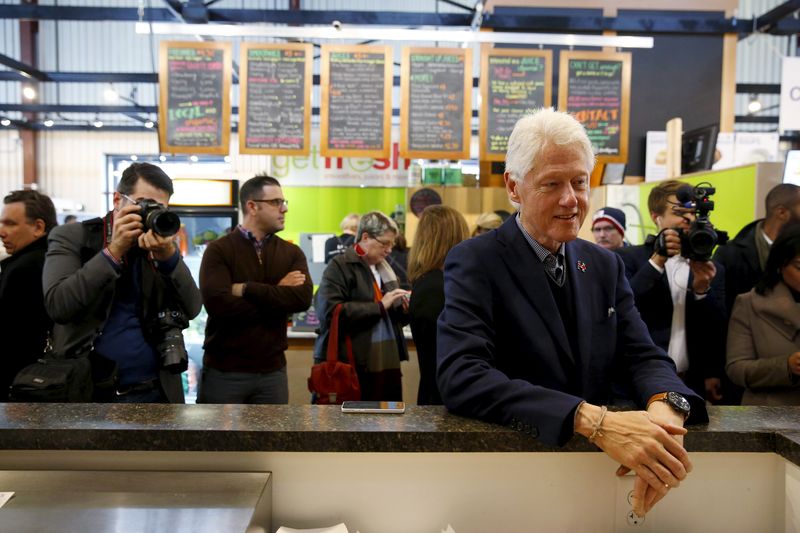By Chris Kahn and Amanda Becker
NEW YORK/MANCHESTER, N.H. (Reuters) - Bill Clinton may not be the "secret weapon" that Hillary Clinton needs in the U.S. presidential race. And the former Democratic president may not become the albatross that Republican candidate Donald Trump expects, either.
Bill Clinton simply is not wielding that kind of influence – good or bad – over voters so far this year, according to a Reuters/Ipsos poll. A majority of Americans, including 73 percent of Democrats and 52 percent of Republicans, said Bill Clinton does not factor into their opinion of Hillary for president. (http://tmsnrt.rs/1OUiYCw)
The poll, conducted Jan. 7 to 13, found that 12 percent of Americans are more likely to vote for Hillary, the former secretary of state, because of her marriage to Bill. Among Democrats, fewer than half said Bill Clinton should be more prominent in his wife's campaign, and less than half felt that his presence in the race would boost her chances of winning.
Bill Clinton, who was widely credited for helping Barack Obama win a second term in 2012, has become much more active on the campaign trail this month, especially in New Hampshire, where Hillary Clinton trails Bernie Sanders in several recent statewide polls. Hillary called Bill her "not-so-secret weapon" when announcing the move, though his increased involvement created an opening for Republicans, especially Trump, to bring up allegations of sexual misconduct that dogged the Clintons in the 1990s.
Despite two terms of strong economic growth and a trade surplus, Bill Clinton's legacy as president has been marked by several high-profile missteps. Several women came forward during his tenure in the White House with allegations of consensual sexual encounters.
He also spent much of his tenure fighting accusations of unwanted advances toward women, including Paula Jones, an Arkansas state employee, who later filed a lawsuit. In 1998, he was impeached by the House of Representatives after attempting to cover-up an affair with another woman, Monica Lewinsky.
After Hillary said that Trump, the Republican front-runner, had shown a "penchant for sexism," the real estate mogul took to Twitter (N:TWTR) to warn the Democratic front-runner against using her husband as a surrogate on the campaign trail.
"If Hillary thinks she can unleash her husband, with his terrible record of women abuse, while playing the women's card on me, she's wrong!" Trump wrote in late December.
Voters, however, do not seem to care. A majority of Americans in the Reuters/Ipsos poll, including 68 percent of Democrats and 50 percent of Republicans, said that Bill's past sexual misconduct "made no difference" in the current presidential race.
Among women, 56 percent said it did not matter, while another 21 percent said it would hurt Hillary Clinton's chances of winning the election. A tiny proportion of women – 4 percent – said they thought the experience would actually help her chances of winning.
Democrats who turned out to listen to the former president this week in New Hampshire dismissed the allegations of sexual misconduct as no longer relevant.
"I just think it's none of our business," said Randall Ferrara, a retired pastor who came to listen to Bill stump in Keene, New Hampshire. "It's old news and a weapon they use when they don't have anything else."
Ferrara said he is still deciding between Clinton and her chief rival, U.S. Senator Bernie Sanders of nearby Vermont. Shirley Ferrara, his wife, said that she would be supporting Hillary. She agreed with the roughly half of Democrats that told Reuters/Ipsos that the former president "should take a prominent role" campaigning for his wife and that it would help her.
"I think he would be an asset to her," Ferrara said.
Rachel Reekie, a Sanders supporter and Keen State University student who was in elementary school during Clinton's presidency, said she was "fully aware" of the allegations.
"It's not a big deal; it's over," Reekie said. "I don't think his presence will have an effect."

The online panel of 1,947 adults has a credibility interval, a measure of accuracy, of about 4 percentage points.